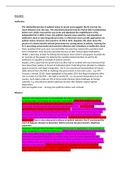Other
A* Essay Plan -- Effectiveness of Judicial Review
- Module
- Paper 2: UK Government
- Institution
- PEARSON (PEARSON)
A full A* Essay Plan that evaluates how effective the Supreme Court is in checking the executive and legislative branches. Attends to both sides of the argument and reaches a nuanced conclusion. This plan helped me to achieve an A* in Politics (80/84 in this paper). I now study at the Universit...
[Show more]



